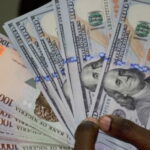As Nigerians grapple with the current economic hardship caused by high inflation and foreign exchange (Forex) instability, a former deputy governor of the Central Bank of Nigeria (CBN), Prof. Kingsley Moghalu, has projected that it may linger for a minimum of two to three years.
Moghalu, who made the assertion during an interview with the BBC on Monday, April 22, expressed concerns that Nigerians are going through a very difficult situation due to the high cost of living crisis as a result of the economic policies of the current administration.
Join our WhatsApp ChannelCommenting on the April 2024 forecast of the International Monetary Fund (IMF) that Nigeria will slip to the fourth largest economy in Africa in 2024, Moghalu said it was due to the effect of the currency crisis in the country.
The political economist argued that the devaluation of the naira caused by economic reforms of the current administration led to the downgrade.
Prime Business Africa recalls that President Tinubu’s administration had last year embarked on economic reforms such as unifying the foreign exchange market windows and floating the naira to allow market forces to determine the value and rate of exchange. This consequently led to the devaluation of the naira as the rate of exchange jumped from about N400 per dollar to over N700 and now over N1,200. the naira recorded slight appreciation within the last two months but has again dropped in value against the dollar. Also, the removal of petroleum subsidies contributed significantly to the continued surge of the inflation rate which is now 33.2 per cent as of March 2024, worsening the cost of living crisis.
According to IMF forecasts, South Africa will be Africa’s largest economy with a GDP of $373 billion, followed by Egypt with $348 billion, and Algeria with $267 billion, while Nigeria is projected to have a total GDP of $253 billion in 2024.
READ ALSO:
Nigeria which has held the title of “Africa’s largest economy” will according to the forecast, lost it.
“It is the devaluation of the naira that has created this situation,” Moghalu stated, adding that the impact is reflected in Nigeria’s current economic challenges.
He said the currency has been devalued because the country does not have enough foreign exchange reserves as it used to have in the past.
He further explained the reason for the naira devaluation saying: “It has been devalued because a lot of foreign exchange inflow into the Nigerian economy has weakened over the past several years and because of the reforms that the present government has unleashed like removing the subsidies on petroleum, removing the subsidies on exchange rate because the CBN has been subsidising the exchange rate and without that subsidy, the naira falls to its market value.
“And there was also a lot of speculation against the naira. These are some of the reasons the naira to the dollar value has dropped. That’s why in the lead table, Nigeria is now fourth. First is South Africa, second is Egypt, third is Algeria, and fourth is Nigeria at this time.”
He further noted that apart from the foreign exchange crisis, there is also high inflation which is now 33.2 per cent as of March 2024. This, he said, manifests in high cost of living, which is again, an outcome of the removal of fuel subsidy.
“The removal of subsidy has made petroleum very expensive, transportation, very expensive. The removal of the subsidy on the naira has again made buying foreign currencies with the naira very expensive, and there is again the removal of subsidies on electricity charges. So, the Nigerian economy is going through a stressful period.”
Need for a more Productive Economy
To address the challenges, Moghalu said Nigerian authorities need to focus on the fundamentals which is making the economy become more productive, not only on issues of the currency and its buying power in terms of the dollar.
“The economy needs to become much more productive. It needs to produce complex value-added goods for export in order to diversify its sources of dollar earnings not just relying on oil.”
He also identified poor electricity supply as another challenge to having a productive economy in the country. He maintained that when the challenge of low production is solve, the country’s economy can then see a significant boost.
Victor Ezeja is a passionate journalist with six years of experience writing on economy, politics and energy. He holds a Masters degree in Mass Communication.

















Follow Us